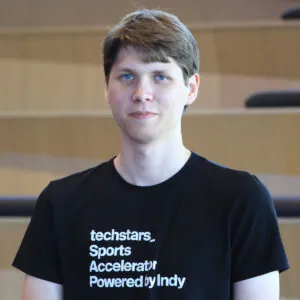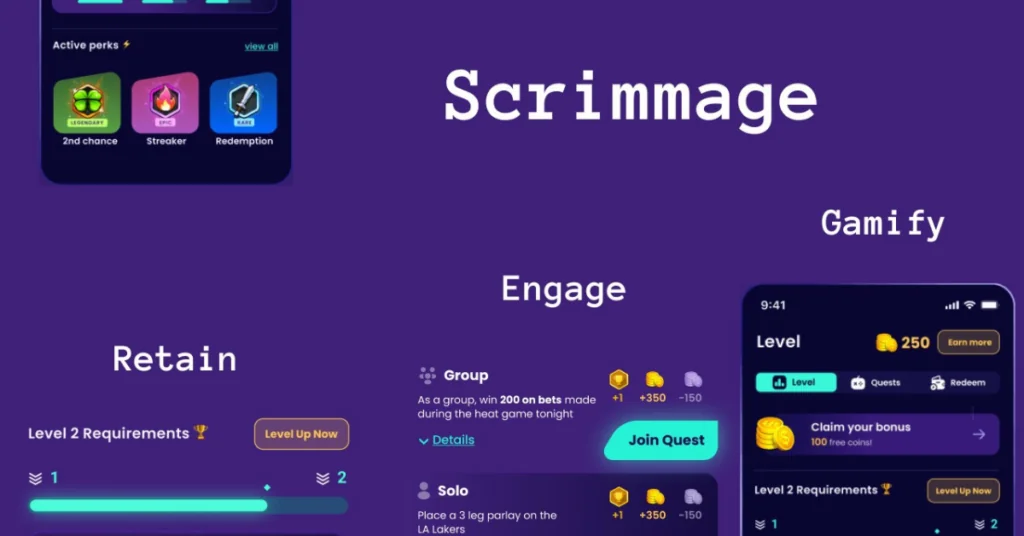Locker Room Labs Sports Technology Spotlight: Yev Rachkovan with Scrimmage
Welcome to the first edition of the Locker Room Labs Sports Technology Spotlight. We sit down with industry experts to discuss the evolving world of sports tech and the incredible innovations being developed in the space. To kick this series off, we spoke with Yev Rachkovan, CTO of Scrimmage, a retention tool for sports betting operators.
How did you get started in software engineering and what drew you to sports technology?
From a young age, I was drawn to the gaming industry and gamification. This passion led me to choose software engineering as my career path. Interestingly, after spending my first two years in college primarily playing Dota 2, I realized that games weren’t closely related to programming. To achieve success, I knew I needed to start learning programming. I began coding at the age of 16, and by the time I was 18, I had secured my first full-time job as a full-stack software engineer.
Two years later, I had the opportunity to meet my co-founders, Matt and Dan, who introduced me to the world of sports technology. After a few strategic shifts, we ultimately ended up developing a gamification platform for iGaming operators.
What is the biggest misconception when it comes to building a sports software startup?
A larger development team doesn’t necessarily guarantee a better outcome. In our Scrimmage journey, we initially had a team of five engineers whom we found on Upwork. We believed that increasing the team size was the solution to our slow progress, and hiring more engineers seemed like the obvious choice. What we didn’t anticipate was that each new engineer was reducing the productivity of the existing team. While bringing in new talent did accelerate progress slightly, the difference was insignificant. We also failed to consider the impact on code quality. The larger the team, the more challenging it is to maintain code quality. As a result, we were compelled to implement strict progress reporting, code reviews, bug fixes, and deployment processes. We also found it necessary to hire a QA engineer. While these measures helped to some extent, it felt like applying a small cotton patch to a vast reservoir with a growing crack.
Eventually, we came to the realization that this approach was not sustainable, and we needed to identify one or two exceptionally talented senior full-stack developers. I believe this decision was the one that rescued our company from a technical perspective. Things became significantly smoother with a leaner team and a high level of trust among team members.

What is the most common mistake you see sports tech founders make when building their business?
Many non-technical founders attempt to build a development team on their own without seeking assistance. Unfortunately, they often underestimate the challenges involved in creating a high-quality development team. They may believe that by hiring a low-cost engineer from platforms like Upwork and sharing their vision, they can quickly and inexpensively bring their product to life. Regrettably, around 90% of such projects end up abandoned. Eventually, these founders come to the realization that their development process is not progressing as expected. Their teams miss deadlines, features are implemented incorrectly, numerous bugs emerge, loading speeds are slow, and they encounter various errors, such as poor mobile adaptation or issues with AdSense and email validation.
At this juncture, many of them begin seeking help from experienced individuals, often ending up in conversations with someone like me. Sometimes, the situation has deteriorated to a point where the best course of action is to discard all the work done thus far and start anew. I’ve witnessed many individuals losing hundreds of thousands of dollars in this manner.
What is your #1 recommendation to sports startups when staffing software engineering talent?
Before embarking on the hiring process, it’s crucial to secure a technical partner whom you can trust. Ideally, this would entail finding a technical co-founder experienced in assembling a development team. At the very least, consider bringing in a Fractional CTO or a technical advisor. Acquiring such expertise for your project might come at a cost in terms of giving up equity or investing in consulting services at rates ranging from $100 to $300 per hour. However, this investment has the potential to save you months of time and hundreds of thousands of dollars, making the return on your investment quite clear.
Even with a reliable technical advisor in place, it will still take time to identify engineers capable of building your product. As mentioned earlier, you can’t simply hire a team of strangers from Upwork and expect them to excel. In the case of Scrimmage, we collaborated with approximately 30 different engineers, and it took us about a year to establish our core development team.
As a viable alternative to building an in-house development team, startups can opt to outsource their development to an agency. Such agencies have already invested years in locating talented engineers, saving you from this extensive search. While hiring engineers from an agency involves additional costs, it spares you from years of searching for your own team and reduces the risk of developing a product that fails.
What qualities do you look for in outsourced app development partners?
Disagreement and proactivity are essential qualities to consider when hiring an outsourcing partner. One of the primary advantages of seeking outside assistance is the additional expertise you gain from your partners. When looking for external help, it’s crucial that the person isn’t overly agreeable or hesitant to engage in constructive debates. Excessive agreeableness can be a common mistake among software developers who may feel intimidated by the financial power of a client. Individuals who can resist such intimidation are immensely valuable to any organization.
However, disagreeableness alone won’t have a significant impact on the organization if it doesn’t translate into action. It’s not enough for someone to disagree with your decisions but never voice their concerns or act on them. Therefore, the ideal development partner should also be proactive. They should have their own opinions and be willing to advocate for and defend them.
When these two characteristics—disagreement and proactivity—are present, it signifies that your product is in the right hands. Such a partner doesn’t just “code” but “owns” the project and takes full responsibility for it.
About Scrimmage
Scrimmage Rewards is designed as a retention tool to help operators in the sports betting space keep their customers. They have done this by designing a gamified rewards program that keeps users more engaged, resulting in a more active user base that continues to come back.
About Locker Room Labs
Locker Room Labs is a US-based and software engineer-owned development team specializing in sports, betting, fantasy, and iGaming. From UX Design and MVP Development to Custom App Development and Staff Augmentation, Locker Room Labs is tailored to bring sports software to life. A testament to their innovation is “The Playbook,” a proprietary sports platform-as-a-service that accelerates development time to market and curtails custom software build costs for clients.




